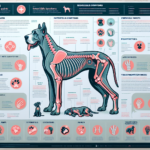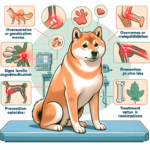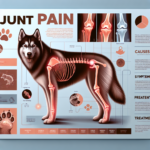Basenji Joint Pain: Causes, Symptoms, Prevention, and Treatment

Introduction
The Basenji, often referred to as the “barkless dog,” is a unique and ancient breed known for its distinctive characteristics and rich history. Originating from Central Africa, the Basenji was primarily used for hunting due to its keen sense of smell and sight. This breed is small to medium-sized, with a sleek, muscular build, and a short, fine coat that comes in various colors, including red, black, tricolor, and brindle. One of the most notable features of the Basenji is its inability to bark; instead, it produces a unique yodel-like sound known as a “baroo.”
While the Basenji is generally a healthy breed, it is not immune to certain health issues. Common concerns include Fanconi syndrome, progressive retinal atrophy (PRA), and hypothyroidism. However, one of the most significant health issues that can affect Basenjis, like many other breeds, is joint pain. Joint health is crucial for maintaining the Basenji’s active and agile lifestyle, making it an essential aspect of their overall well-being.
Breed-Specific Joint Pain Risks
Genetic Predisposition
Basenjis, like many purebred dogs, can be genetically predisposed to joint-related issues. Hip dysplasia, a condition where the hip joint does not fit into the hip socket properly, can occur in Basenjis, although it is less common compared to larger breeds. Elbow dysplasia, another genetic condition affecting the elbow joint, can also be a concern. Arthritis, a degenerative joint disease, can develop as a secondary condition to these joint abnormalities or as a primary condition due to wear and tear over time.
Age-Related Risks
As Basenjis age, the risk of developing joint pain increases. While they are generally active and healthy in their younger years, signs of joint pain may start to appear as they reach middle age, around 6-8 years old. Senior Basenjis, typically over 10 years old, are more prone to arthritis and other degenerative joint conditions. Regular veterinary check-ups are essential to monitor joint health as the dog ages.
Activity Level and Joint Stress
Basenjis are known for their high energy levels and love for physical activity. They require regular exercise to stay healthy and happy. However, their active lifestyle can also contribute to joint stress, especially if they engage in high-impact activities like jumping or running on hard surfaces. Owners should be mindful of providing appropriate exercise that does not overly strain their joints.
Common Symptoms of Joint Pain in Basenjis
General Symptoms
Owners should be vigilant for common symptoms of joint pain in their Basenjis, which may include:
- Limping or favoring one leg
- Stiffness, especially after rest or sleep
- Reluctance to move, jump, or climb stairs
- Decreased activity or playfulness
- Swelling or heat around the joints
- Whining or showing signs of discomfort when touched
Breed-Specific Symptoms
While the general symptoms of joint pain are similar across breeds, Basenjis may exhibit some breed-specific signs. Due to their high energy levels, a noticeable decrease in activity or reluctance to engage in their usual playful behavior can be a significant indicator of joint pain. Additionally, Basenjis may become more irritable or show changes in behavior if they are experiencing discomfort.
When to Consult a Vet
If you notice any of the above symptoms in your Basenji, it is essential to consult a veterinarian promptly. Early diagnosis and intervention can help manage joint pain more effectively and improve your dog’s quality of life. Regular veterinary check-ups are also crucial for monitoring joint health and catching any issues early.
Preventive Measures for Joint Health
Exercise Recommendations
Maintaining an appropriate exercise routine is vital for the joint health of Basenjis. While they need regular physical activity, it is essential to balance high-energy play with low-impact exercises. Activities such as walking, swimming, and controlled play sessions can help keep their joints healthy without causing excessive strain. Avoid activities that involve repetitive jumping or running on hard surfaces.
Dietary Suggestions
A balanced diet rich in essential nutrients can support joint health in Basenjis. Consider incorporating foods or supplements that contain glucosamine, chondroitin, and omega-3 fatty acids, which are known to promote joint health. High-quality commercial dog foods often include these nutrients, but consult your veterinarian for specific dietary recommendations tailored to your Basenji’s needs.
Weight Management
Maintaining a healthy weight is crucial for reducing joint stress in Basenjis. Excess weight can exacerbate joint pain and lead to more severe conditions. Monitor your dog’s weight regularly and adjust their diet and exercise routine as needed to keep them at an optimal weight. Your veterinarian can provide guidance on the ideal weight range for your Basenji.
Early Screening and Monitoring
Early screening and regular monitoring can help catch joint issues before they become severe. Consider having your Basenji undergo hip and elbow evaluations, especially if you plan to breed them. Regular veterinary check-ups, including physical examinations and possibly X-rays, can help detect early signs of joint problems and allow for timely intervention.
Treatment Options for Joint Pain
Non-Surgical Treatments
For Basenjis experiencing joint pain, several non-surgical treatment options can help manage their condition:
- Medications: Nonsteroidal anti-inflammatory drugs (NSAIDs) can help reduce pain and inflammation. Your veterinarian may also prescribe pain relievers or joint supplements.
- Physical Therapy: Physical therapy can improve joint mobility and strengthen the muscles around the joints. Techniques such as hydrotherapy, laser therapy, and massage can be beneficial.
- Lifestyle Adjustments: Modifying your Basenji’s activity level and providing a comfortable living environment can help manage joint pain. Avoid high-impact activities and provide supportive bedding.
Surgical Options
In severe cases of joint pain, surgical intervention may be necessary. Some common surgical options for Basenjis include:
- Hip Replacement: Total hip replacement can be an effective solution for severe hip dysplasia or arthritis.
- Arthroscopy: Minimally invasive surgery to remove damaged tissue or repair joint structures.
- Joint Fusion: In cases of severe joint instability, joint fusion surgery can provide stability and reduce pain.
Surgical options should be considered carefully and discussed with your veterinarian to determine the best course of action for your Basenji.
Alternative Therapies
Alternative therapies can complement traditional treatments and provide additional relief for joint pain in Basenjis:
- Acupuncture: Acupuncture can help reduce pain and inflammation by stimulating specific points on the body.
- Hydrotherapy: Water-based exercises can improve joint mobility and reduce pain without putting stress on the joints.
- Massage: Regular massage can help relax muscles, improve circulation, and reduce joint pain.
Lifestyle and Management Tips
Daily Care Routine
Establishing a daily care routine can help manage and alleviate joint pain in Basenjis:
- Provide regular, low-impact exercise such as walking or swimming.
- Incorporate joint supplements into their diet as recommended by your veterinarian.
- Monitor their weight and adjust their diet and exercise routine as needed.
- Perform regular joint massages to improve circulation and reduce stiffness.
- Ensure they have a comfortable and supportive bed to rest on.
Modifying the Home Environment
Making adjustments to your home environment can help your Basenji feel more comfortable:
- Use ramps or steps to help them access furniture or climb stairs.
- Provide orthopedic beds that offer better support for their joints.
- Keep their living area warm, as cold temperatures can exacerbate joint pain.
- Ensure their food and water bowls are at a comfortable height to reduce strain on their neck and joints.
Long-Term Management
Long-term management strategies are essential for keeping your Basenji active and happy despite joint pain:
- Maintain regular veterinary check-ups to monitor their joint health.
- Adjust their exercise routine as needed to accommodate their condition.
- Continue providing joint supplements and a balanced diet.
- Stay informed about new treatments and therapies that may benefit your Basenji.
FAQs About Basenjis and Joint Pain
What are the early signs of joint pain in Basenjis?
Early signs of joint pain in Basenjis include limping, stiffness, reluctance to move, decreased activity, and changes in behavior. If you notice any of these symptoms, consult your veterinarian for a thorough evaluation.
Can joint pain in Basenjis be prevented?
While it may not be possible to prevent joint pain entirely, you can take steps to reduce the risk. Maintain a healthy weight, provide appropriate exercise, offer a balanced diet with joint-supporting nutrients, and schedule regular veterinary check-ups to monitor joint health.
Are there specific exercises that are better for Basenjis with joint pain?
Low-impact exercises such as walking, swimming, and controlled play sessions are ideal for Basenjis with joint pain. Avoid high-impact activities like jumping or running on hard surfaces, as these can exacerbate joint issues.
What dietary supplements can help with joint pain in Basenjis?
Supplements containing glucosamine, chondroitin, and omega-3 fatty acids can support joint health in Basenjis. Consult your veterinarian for specific recommendations and dosages tailored to your dog’s needs.
When should I consider surgery for my Basenji’s joint pain?
Surgery should be considered if non-surgical treatments are not providing sufficient relief and your Basenji’s quality of life is significantly affected. Discuss the potential benefits and risks of surgical options with your veterinarian to determine the best course of action.
Conclusion
Joint pain is a significant concern for Basenjis, but with proper care and attention, it can be managed effectively. By understanding the causes, symptoms, preventive measures, and treatment options, you can help ensure your Basenji maintains a healthy and active lifestyle. Regular veterinary check-ups, a balanced diet, appropriate exercise, and a supportive home environment are key to promoting joint health and overall well-being. Remember to consult your veterinarian regularly to address any concerns and provide the best care for your beloved Basenji.




